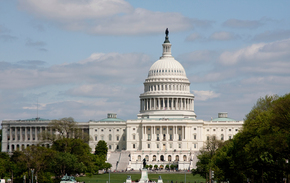The WPJ
THE WORLD PROPERTY JOURNALReal Estate Facts Not Fiction
Commercial Real Estate News

Extension of 15-Year Leasehold Improvement Depreciation OKed by Senate Committee
Commercial News » North America Commercial News Edition | By Hortense Leon | August 13, 2012 9:00 AM ET
 If commercial real estate owners have their way, the tax extenders bill approved by the Senate Finance Committee before the August recess will be passed by the full US House and Senate this fall.
If commercial real estate owners have their way, the tax extenders bill approved by the Senate Finance Committee before the August recess will be passed by the full US House and Senate this fall.One of the items in the bill is the reinstatement and extension of the 15-year leasehold improvement provision which would be retroactive to the beginning of 2012 and apply to all of 2013. If this provision is not extended, it would--along with a number of other tax provisions--expire on December 31, 2012.
"This is a very welcome development as this legislation allows leasehold improvement construction costs to be more accurately aligned with the income generated by tenant leases," says Real Estate Roundtable president and CEO Jeffrey DeBoer.
A 2010 policy paper put out by the Real Estate Roundtable explains the rationale in more detail, noting that: "Studies by Treasury, Congress and the real estate industry have concluded that the current tax depreciation lives for non-residential structures (39 years) and residential structures (27.5 years) exceed the useful lives of such properties (due to physical wear and tear plus technological obsolescence). Policy makers should reduce the depreciation period for both assets to a period that more closely reflects the economic lives of such structures..."
The tax provision passed last week by the Senate Finance Committee seems to follow the advice of the paper. It would allow property owners to recover the cost of building out a tenant space over 15 years instead of 39, freeing up capital that can be reinvested, possibly in job creation.
The 15-year leasehold improvement depreciation provision was part of a $205 billion bipartisan package of tax extenders that also includes a two-year "patch" to prevent middle-income taxpayers from having to pay the alternative minimum tax, an extension of the research and development tax credit and an extension of the deduction for state sales tax through 2013. The package originally included a provision allowing same-year expensing of brownfields cleanup costs, but that provision was taken out of the bill during the Senate Finance Committee's deliberations.
"Depreciation is a non-cash expense, so the depreciable component reduces taxable income," says Tom Dixon, president of Miami-based Dixon Commercial Real Estate, Inc. "It is one of the ways that the government can stimulate economic activity," he says. In fact, it may encourage people to buy new equipment, because they will have more money to spend, says Dixon.
Sign Up Free | The WPJ Weekly Newsletter
Relevant real estate news.
Actionable market intelligence.
Right to your inbox every week.
Real Estate Listings Showcase
Related News Stories
Commercial Real Estate Headlines
- Investment in Asia Pacific Multifamily Properties to Double by 2030
- Multi-story Warehouses Are 15 Percent of Sydney's New Industrial Stock
- Manhattan Office Leasing Activity Lags in Q3 as Sentiment Remains Cautious
- Nonresidential Construction Spending Increases in America
- Office Conversions on Pace to Double in U.S.
- Hong Kong Office Vacancy Rates Stabilize After 4 Months of Increases
- Commercial Mortgage Debt Outstanding in U.S. Jumps to $4.60 Trillion in Mid 2023
- Architecture Billings Index in U.S. Remains Flat in July
- Commercial Mortgage Delinquencies Rise in America
- U.S. Data Center Demand Explodes in U.S., Driven by AI Growth in 2023
- Demand for Electric Vehicle Manufacturing Space Jumps Across the U.S.
- Global Cross Border Commercial Property Capital Flows Implode 52 Percent Annually in 2023
- 2023 Financing Constraints Rapidly Drive Down Construction Starts in U.S.
- New York City Named as U.S. Leader in Climate Change Resilience
- Tokyo is the City of Choice for Global Retailers in 2023
- Despite VC Cooldown, Life Sciences Represents 33 Percent of New Office Construction in 2023
- Despite Reduced Credit, U.S. Multifamily Developer Confidence Remained Positive in Q2
- Brisbane Office Market Enjoying Strong Leasing Activity in 2023
- Commercial Lending Dampened in 2023 by U.S. Market Uncertainty
- Asia Pacific's Commercial Investment Market Continues to be Challenged in 2023
- Despite Global Economic Uncertainty, Commercial Investment in Japan Grew in Q2
- U.S. Commercial Lending to Dive 38 Percent to $504 Billion in 2023
- Apartment Markets Across America Continue to Stabilize in 2023
- Cap Rates for Prime Multifamily Assets in U.S. Stabilize in Q2
- Ireland Office Market Making a Comeback in 2023
- U.S. Office Sales Total $15 Billion Halfway Through 2023
- AI and Streaming Drive Global Data Center Growth Despite Power Constraints
- Asia Pacific Logistics Users Plan to Expand Warehouse Portfolio in 2023
- Manhattan Retail Rents Continue to Rise in Q2
- Manhattan Office Leasing Activity Down 29 Percent Annually in Q2
- Commercial Property Investment in Australia Dives 50 Percent in 2023
- U.S. Architecture Billings Uptick in May
- Employees Return to Office Trend Growing in Asia Pacific Markets
- Exponential AI Growth to Drive Asia Pacific's Data Center Market
- Large Opportunity to Transform Australia's Office Market in Play
- Australian Industrial Rent Growth to Continue in 2023
- Corporate Relocations in U.S. at Highest Rate Since 2017
- North American Ports Volume Drops 20 Percent Annually in 2023
- Office Investment in Asia Pacific Remains Strong Despite Weaker Sentiment
- Australia's Build-to-Rent Properties Uptick on Lender's Wish List in 2023
Reader Poll
Marketplace Links
This website uses cookies to improve user experience. By using our website you consent in accordance with our Cookie Policy. Read More





